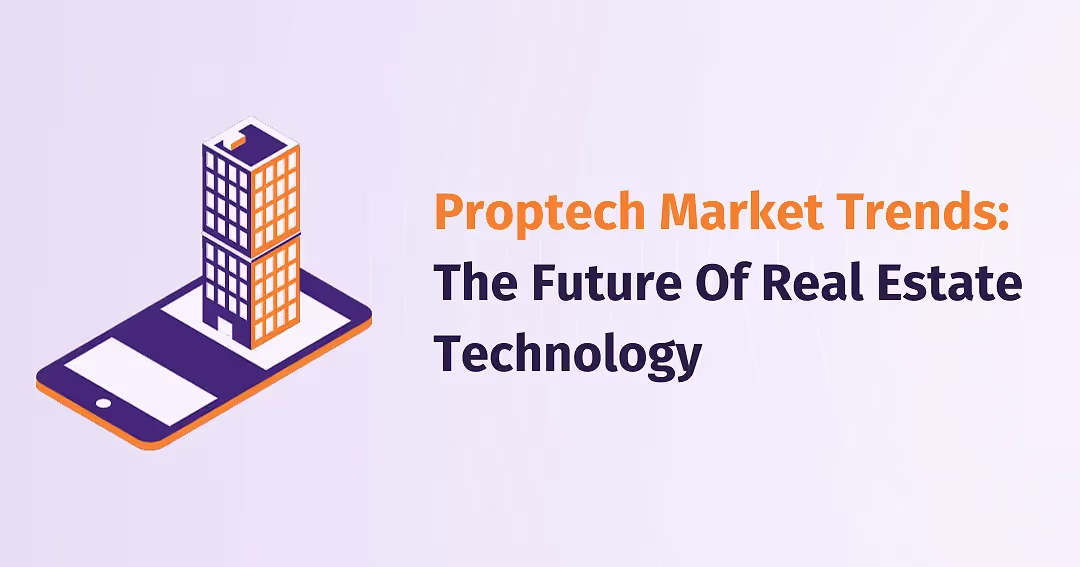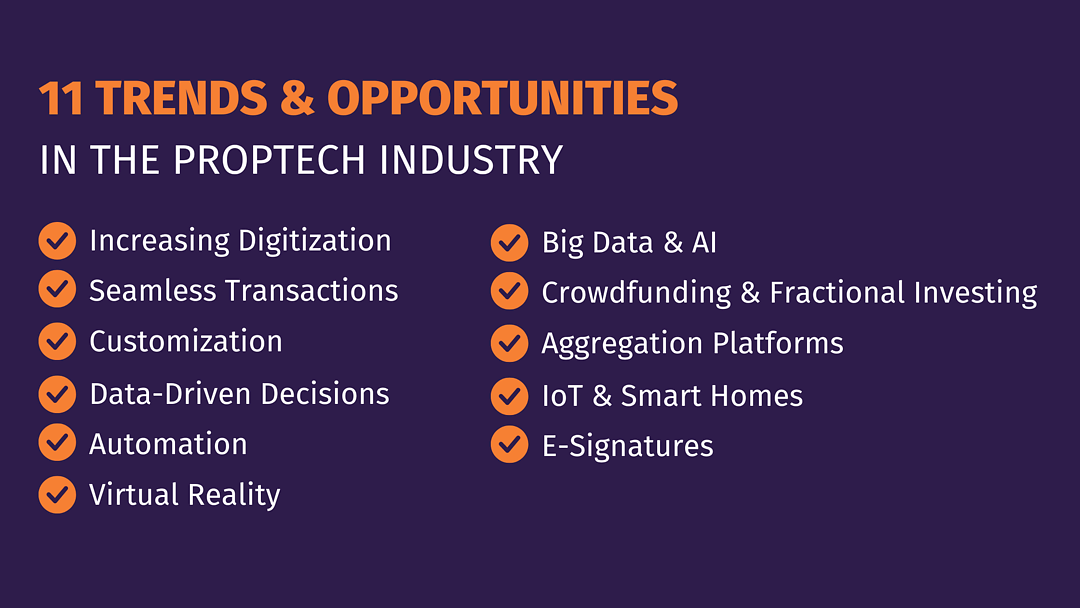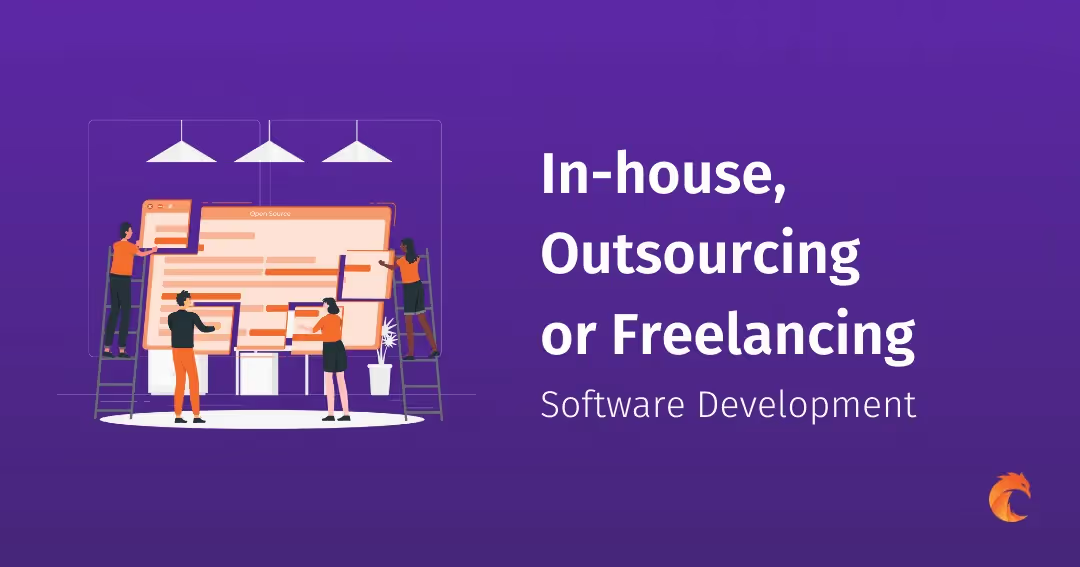Proptech Market Trends: The Future Of Real Estate Technology


The PropTech industry, a blend of property and technology, represents a rapidly growing sector where innovation is reshaping how you buy, sell, and manage real estate.
With a market valuation that has reached significant billions, the sector shows no signs of slowing down. Its trajectory suggests a continued upward trend with technology becoming increasingly integral to the real estate market's operations and strategy.
Your understanding of current trends in real estate technology is crucial as these innovations influence the market's efficiency, accessibility, and profitability. Proptech trends such as artificial intelligence, machine learning, and big data are not just buzzwords but instrumental tools that will help shape the future of real estate. Engagement with these trends could see enhancements in property management, investment decisions, and customer experience.
Moreover, incorporating Proptech into commercial real estate has become essential for staying competitive in a digitized world. Your ability to adapt to these trends in property technology is directly linked to the level of innovation and service you can provide. With growth projections promising, understanding and leveraging these technologies can offer a significant edge in an industry on the brink of digital transformation.
Overview of PropTech Market Size & Growth
This article will guide you through the latest trends and technologies shaping the future of property dealings, simplifying your life as an investor, agent, or homeowner. Get ready for the world of high-tech real estate!
Key Technological Advancements
- Artificial Intelligence & Machine Learning: These technologies have enabled the analysis of big data for smarter decision-making and predictive analytics in real estate.
- Blockchain: Introduced as a means for securing transparent and efficient property transactions.
- Internet of Things (IoT): IoT devices have significantly increased operational efficiency within property management through real-time data and automation systems.
Market Share & Trends Analysis
Understanding the current Proptech market requires its size, growth, and prevailing trends. Let’s check numbers and directions – where this tech-centric real estate world is headed.
| Factor | Influence on Market Share & Growth |
|---|---|
| Market Size & Growth | Proptech is witnessing exponential growth with increasing venture capital investment flowing into real estate technology. |
| Property Type | Commercial real estate has been a significant adopter, while residential market is catching up swiftly. |
| Solution | Property management and transaction solutions are high in demand, simplifying operations and sales processes. |
| Deployment | Cloud-based Proptech solutions are outpacing on-premise solutions, providing scalability and remote accessibility. |
| End-User | Real estate agents, property managers, and owners are the primary users, with tenants and buyers rapidly becoming tech-savvy participants. |
| Region | North America and Europe lead in adoption, but Asia-Pacific regions are showing robust growth as technology penetration increases. |

11 Trends & Opportunities in the Proptech Industry
The Proptech landscape is brimming with innovations that are reshaping the fabric of real estate as we know it. From revamping transactional efficiency to enhancing user experiences, these top trends are not just riding the wave of change—they're creating it.
1. Increasing Digitization
Increasing digitization is revolutionizing the proptech market, making it easier for real estate professionals and clients to navigate transactions. Digital tools are streamlining processes from property search to final sale, offering platforms that provide virtual tours and instant access to property data.
This technology shift reduces paperwork, speeds up communication, and improves accuracy by minimizing human error.
Investors and homebuyers now expect tech-forward solutions that can be accessed with just a few clicks on their smartphones or computers. From cloud-based management systems to online financing options, digital innovation is at the forefront of transforming the real estate industry's landscape.
Moving seamlessly from increasing digitization, we see how this integration facilitates smoother transactions in the following trend: Seamless Transactions.
2. Seamless Transactions
The proptech market is making real estate transactions smoother than ever before. Imagine selling or buying property with just a few clicks—this is no longer science fiction, it's today’s reality! Digital platforms now offer secure and efficient transaction processes, eliminating the hassle of paperwork and streamlining communication between buyers, sellers, and agents.
These innovations are not only saving time but also increasing transparency in deals.
Buyers can easily access mortgage approvals online while sellers benefit from digital listings that reach wider audiences. Real-time updates keep everyone informed throughout every step of the transaction.
Smart contracts powered by blockchain technology further enhance security, ensuring that all parties honor their agreements without any disputes or delays. The future shines bright for seamless transactions in the proptech industry; they're set to revolutionize how we understand property dealings forever.
3. Customization
Customization is redefining the proptech market overview with a shift towards personalizing real estate services and products. Today's tech-savvy clients expect solutions that cater directly to their individual needs, whether it's finding the perfect home or managing property investments efficiently.
Proptech companies are responding to this demand by offering more flexible software platforms where users can tweak features according to their preferences.
Imagine being able to design your own dashboard on a property management system or receive recommendations for homes based on your lifestyle and habits – that’s customization in action.
It moves beyond one-size-fits-all approaches, allowing businesses and consumers alike to benefit from tailored experiences. This trend not only increases user engagement but also fosters loyalty as clients come to appreciate a service that seems handcrafted just for them.
Embracing customization can be a game-changer for real estate professionals looking to stand out in a crowded marketplace by delivering unparalleled value through personalized interactions and offerings.
4. Data-Driven Decisions
In the Proptech industry, making decisions based on data is becoming the norm. Real estate professionals harness powerful analytics to understand market trends and predict future movements.
This shift towards data-driven strategies helps them identify profitable investments and improve client satisfaction by offering tailored solutions.
Using big data, AI, and machine learning, companies can fine-tune their business models for maximum efficiency. They track patterns in consumer behavior, optimize property listings for better reach, and manage assets with unprecedented precision.
This approach not only streamlines operations but also significantly reduces risks associated with human error and intuition-based decision-making.
5. Automation
Automation is revolutionizing the PropTech industry by streamlining complex processes and reducing manual labor. Imagine property management systems that automatically handle scheduling repairs, tracking rent payments, or adjusting smart building controls without human intervention.
This technology isn't just a futuristic dream—it's here now and it's changing how real estate professionals do business every day.
Real estate businesses are increasingly embracing automation tools to boost efficiency, cut costs, and offer better services to clients. These intelligent systems can analyze large volumes of data quickly, making accurate predictions about market trends or identifying investment opportunities at lightning speed.
The shift towards automated solutions paves the way for more sophisticated use cases like predictive maintenance and advanced analytics that will continue pushing the boundaries of what's possible in real estate tech.
6. Virtual Reality
Immerse yourself in properties without leaving your couch with virtual reality. This game-changing technology transforms the way you experience real estate, allowing for virtual walk-throughs of homes and commercial spaces across continents.
Picture this: instead of flipping through photos or arranging multiple visits, you can explore every corner of a potential new home as if you were there.
Real estate agents are leveraging VR to showcase properties in stunning detail, giving you a feel for the layout and ambiance right from your first viewing. It cuts down on time and travel, making house hunting more efficient than ever before.
With virtual reality, the property market opens up to buyers globally, who can now view and fall in love with spaces thousands of miles away as vividly as if they were stepping through the front door.
7. Big Data & AI
As virtual reality reshapes property viewing, Big Data and AI are revolutionizing how real estate professionals understand markets and client needs. These tools collect vast amounts of information from various sources, allowing for in-depth analysis of trends and patterns.
Agents can now predict market movements more accurately, personalize recommendations for clients, and streamline operations with these data-driven insights. AI algorithms help in pricing properties competitively by analyzing local market data, historical sales figures, and current listings to find the optimal asking price.
Harnessing the power of machine learning, real estate platforms provide users with intelligent suggestions tailored to their preferences. You'll notice search results getting smarter over time as they adapt to feedback provided by users' interactions.
Moreover, predictive analytics enable investors to identify potential yields on properties before making purchasing decisions. In property management too, AI systems offer solutions that predict maintenance issues before they become costly problems—ensuring tenants have less downtime and landlords save money on repairs.
8. Crowdfunding & Fractional Investing
Crowdfunding platforms are reshaping the way individuals can invest in real estate by pooling together smaller amounts of money from a group of investors. This approach allows you to back property investments with less capital, making entry into the real estate market accessible to more people than ever before.
Whether it's funding new developments or supporting existing projects, these platforms offer a unique path for diversifying your investment portfolio without needing deep pockets.
Fractional investing takes this concept further by breaking down property ownership into even smaller shares. You could own part of an apartment complex, office building, or commercial space through fractional shares that align with your budget constraints.
This method brings an unprecedented level of flexibility and simplicity to investing in high-value properties that were once outstripped for average investors. The process is typically managed online, presenting a hassle-free experience right at your fingertips—with transparency and control over where your money goes.
9. Aggregation Platforms
Aggregation platforms are revolutionizing the way people search for and manage real estate by consolidating property listings, services, and data from multiple sources into a single user-friendly interface.
Imagine having the power to browse hundreds of property options from countless websites with just a few clicks. These platforms make this possible, offering streamlined access to a vast array of choices without the hassle of visiting numerous sites or consulting various agents.
For investors and tenants alike, these digital hubs provide an enhanced experience by leveraging targeted filters that drill down to the most suitable properties based on individual preferences such as location, price range, amenities, and more.
They not only simplify the initial search process but also offer valuable tools for comparing properties side-by-side. This empowers users with better decision-making capabilities while saving them precious time in their quest for the perfect real estate opportunity.
10. IoT & Smart Homes
Imagine controlling your lights, thermostat, and security system from anywhere in the world with just a few taps on your smartphone. That's the power of IoT, or Internet of Things, which is transforming houses into smart homes.
These connected devices can learn your habits and adjust themselves to save energy, offer more security, and increase convenience. Gone are the days of wondering if you left the oven on; now you can check and control it remotely.
Smart home technology is a game-changer for property owners looking to elevate their living experience and appeal to tech-savvy tenants. It's no longer a futuristic concept but a present-day reality that buyers expect when they're searching for modern homes.
And with this shift towards high-tech domiciles comes an array of possibilities for real estate professionals who can tap into this trend to differentiate properties in a competitive market.
11. E-Signatures
Moving from the intuitive control of smart homes, e-signatures represent another technological advancement simplifying real estate transactions. You'll find that this digital tool allows documents to be signed securely and legally online, eradicating the need for physical paperwork.
Consider how time-consuming traditional signings can be; with e-signatures, you slash the hours down to minutes.
This trend isn't just about speed—it also offers greater convenience and flexibility. Buyers, sellers, and agents can sign contracts from anywhere in the world without meeting face-to-face.
This efficiency is revolutionizing how deals are done by enabling a smoother, faster closing process that keeps pace with our on-the-go lifestyle. Adopting e-signature technology ensures your real estate dealings stay current and competitive in an increasingly digital marketplace.
How PropTech is Transforming the Real Estate Industry
As you explore the real estate landscape, it's clear that PropTech has not just entered the game; it's changing all the rules. From streamlining operations to customizing user experiences, technology's integration into real estate is reshaping every interaction and transaction in this sector.
Benefits of PropTech
PropTech revolutionizes real estate with efficient, tech-driven solutions. Faster closings become a reality as digital tools streamline transactions and paperwork. These innovations reduce the time spent on manual tasks, allowing agents and investors to focus on building client relationships and expanding portfolios.
Smart technology integration in properties adds convenience and security, enhancing livability while potentially increasing property values.
The use of big data analytics empowers more informed investment decisions by providing comprehensive market insights. This level of detail allows for pinpoint accuracy in predicting trends and identifying profitable opportunities.
PropTech isn't just about adapting to change; it's creating new standards that redefine the contemporary landscape of buying, selling, and managing real estate. Next up: Impact on Traditional Approaches – how these technologies are shaking up long-established industry practices.
Impact on Traditional Approaches
The wave of PropTech is pushing real estate professionals to adapt or risk being left behind. Long-standing practices such as paper-based transactions, face-to-face meetings, and manual data analysis are undergoing a major transformation.
Agents now leverage digital platforms for property listings, virtual tours replace physical showings, and smart algorithms provide insights on market trends that humans alone couldn't process in reasonable timeframes.
This shift calls for brokers and agents to become tech-savvy quickly. They must embrace tools like CRM systems for managing client relationships and mobile apps that allow instant communication with potential buyers.
On the flip side, clients expect faster responses and more transparent dealings; thus, realtors who use these technologies can offer a level of service traditional methods never could.
The result is an industry moving towards greater efficiency, accuracy, and customer satisfaction—all thanks to the innovative solutions that Proptech provides.
Key Players & Market Share Insights
Understanding the movers and shakers in the PropTech industry is essential to grasp the market's dynamics. These key players are innovating and shaping the future of real estate technology. They command significant market share and drive trends that smaller competitors and new entrants often follow. Below we present the companies leading the charge and their contributions to the PropTech landscape.
| Company | Focus Area | Market Share Insights |
|---|---|---|
| Zillow | Online Real Estate Marketplace | Strong presence in residential property listings with innovative tools like Zestimate |
| Opendoor | Real Estate Transaction Facilitation | Revolutionizes home buying and selling with instant offers and quick closings |
| Redfin | Real Estate Brokerage and Online Platform | Innovates with a customer-first approach and cutting-edge technology for agents |
| Compass | Real Estate Technology | Empowers agents with a suite of innovative tools and technology |
| RE/MAX | Real Estate Franchise | Global footprint with a vast network of agents and brokers |
| Procore Technologies | Construction Management Software | Leads in cloud-based construction management solutions |
| Airbnb | Online Marketplace for Lodging | Disrupts traditional lodging with a platform for short-term rentals |
| CoStar Group | Commercial Real Estate Information | Industry leader in commercial property analytics and market insights |
| RealPage | Property Management Software | Provides end-to-end property management solutions for multifamily units |
As the PropTech industry evolves, these companies will likely continue to dominate the conversation. Each player brings unique breakthroughs and solutions, pushing the boundaries of what technology can accomplish in real estate. Keep an eye on these trendsetters as they pave the way for emerging future trends in PropTech. Transitioning to what lies ahead, we can anticipate innovative disruptions and increased adoption of new technologies.
Emerging Future Trends in Proptech
As you keep up with the ever-evolving PropTech landscape, don't miss out on the emerging trends shaping the future of this sector. These innovations are set to redefine how we interact with real estate technology, driving a shift towards more sustainable practices and secure transactions.
ESG Values & Green Construction
Environmental, social, and governance (ESG) values are pushing the boundaries in real estate technology. Green construction is no longer just a buzzword; it's becoming a core part of how developers plan projects.
Builders use PropTech to create energy-efficient buildings with lower carbon footprints. These structures contribute to a healthier environment and can even cut down on operating costs.
Innovative materials and intelligent design software lead this eco-friendly charge. Smart sensors monitor energy usage while automated systems adjust lighting or temperature for maximum efficiency.
Investors now seek properties that align with ESG standards, recognizing both their ethical impact and long-term financial benefits. This shift towards sustainability isn't just good for the planet—it's reshaping investment strategies and asset valuations in property markets worldwide.
Data Privacy & Security
Keeping your personal and financial information safe is a top priority in the PropTech world. As technology advances, data privacy and security have become critical concerns for buyers, sellers, and real estate professionals alike.
Smart encryption techniques are now essential tools to protect sensitive data from cyber attacks. Companies invest heavily in robust cybersecurity measures to safeguard client information throughout the transaction process.
You should feel confident that your data is secure when dealing with modern real estate platforms. PropTech firms are employing advanced security protocols including multi-factor authentication and continuous monitoring systems to prevent unauthorized access.
The industry's dedication to creating a secure digital environment not only builds trust but also ensures compliance with stringent data protection regulations like GDPR. With these precautions in place, you can engage with online realty services knowing your private details remain just that—private.
Blockchain Technology
Moving from the critical discussions on data privacy and security, blockchain technology emerges as a game-changer in the PropTech landscape. This innovative tech brings transparency to real estate transactions by creating immutable records of ownership and history that anyone can verify but no single entity controls.
Imagine closing deals without mountains of paperwork or anxiety over fraud; blockchain makes it possible by enabling secure digital contracts known as smart contracts. These self-executing agreements with the terms directly written into code can save you time and reduce errors.
Blockchain goes beyond simplifying transactions; it revolutionizes how properties are owned and invested in. Through tokenization, real estate assets can be divided into shares represented by tokens, making property investment accessible to more people.
This means you could own a piece of prime real estate for a fraction of what it would cost to buy outright – all easily traded on digital platforms secured by blockchain's robust architecture.
With this technology at your fingertips, the future where buying and selling property is as simple as clicking a button isn't just possible—it's rapidly becoming reality.
Conclusion
The Proptech industry is on a significant upward trajectory. Your understanding of this market's evolution is crucial to capitalizing on its growth. By 2032, proptech valuation is expected to surge, with estimates forecasting a jump to $86.5 billion.
- Proptech's future is marked by digitization and innovation. These trends impact how you interact with real estate technology and investments.
- The forecast is affirmative, projecting a strong upward curve in adoption and value.
It's essential to acknowledge the role of emerging technology in reshaping your interaction with the real estate market. The advent of AI, IoT, and big data analytics in proptech offers you opportunities to streamline operations, enhance customer experiences, and make better-informed decisions.
The proptech market trends indicate a compound annual growth rate that could transform how businesses operate and how customers engage with real estate services. Staying attuned to these changes will empower you to navigate the market with enhanced foresight and agility.
Your strategy should incorporate a robust understanding of proptech's potential to foster growth and efficiency in your real estate endeavors. Embracing these innovations positions you to benefit from what is poised to be an expansive proptech landscape in the years to come.
Ready to scale your business with the right tech partner?
Related posts
Dive deeper into this topic with these related posts
You might also like
Discover more content from this category
As the CEO of an international company or a budding start-up, you are faced with the challenges. It is a responsible decision that will affect the development of your company, but also its economic status and market position.
Why and how to prepare for the promotion of your application or SAAS system long before the premiere? Is the MVP stage a good moment to start marketing activities? How to promote your early-stage app and why you should do this?
The Curiosum way of greeting newly hired employees and keeping the employee lifecycle and workplace culture thriving.







